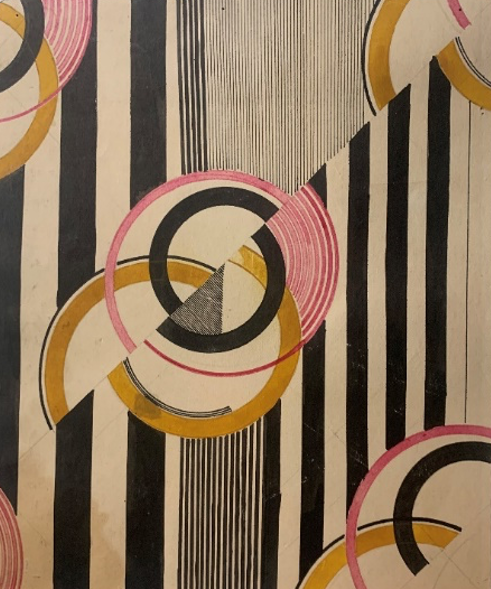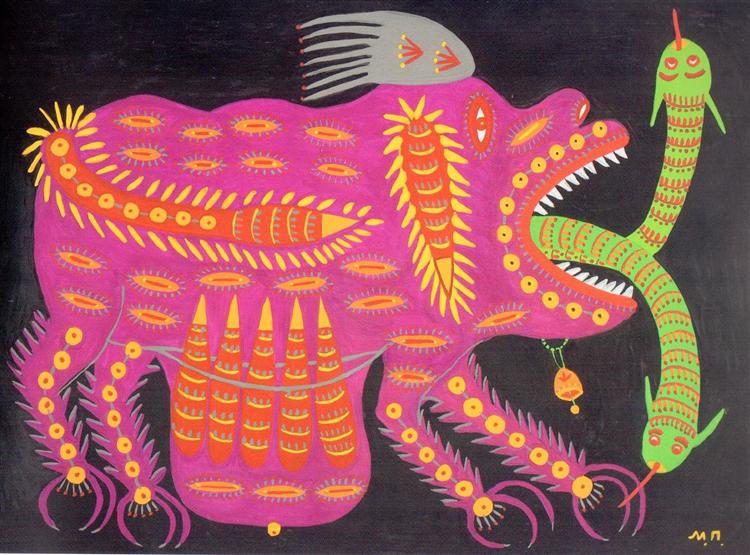About
The Department of Slavic Languages in the Faculty of Languages and Cultures offers a broad range of courses for undergraduate majors and minors in Russian, for students from other undergraduate schools, and for graduate students in the Center for Eurasian, Russian, and East European Studies (CERES) and other graduate programs.

Nina Volkova, After Malevich (1982)
In addition to a full slate of courses in the Polish, Russian, and Ukrainian languages, the Slavic department offers upper-level courses in Russian and East European literature, film, and culture from the early nineteenth century to the present day. Our department includes faculty with expertise in women and gender studies, Tolstoy and Dostoevsky, modernism and the avant-garde, Ukrainian culture, Soviet, Russian, and Polish film, and post-Soviet culture. Many upper-level courses are conducted in Russian, but every semester, we offer several courses entirely in English, many of which fulfill Georgetown University’s core requirements. Each year we offer a two-semester sequence of introductory one-credit courses in Russian culture called Russia A-Z. Many of our faculty also teach Writing and Culture seminars for first-year students on themes related to our region. The Department invites senior majors with the requisite grade-point average to write an honors thesis on a topic of their choosing, either in the context of a fourth-year course or on a tutorial basis.
Russian

Liubov Popova, Textile Design (1921–23)
Georgetown offers one of the most rigorous Russian-language programs in the country. Students take two years of intensive Russian language before continuing to either study abroad or take advanced courses in grammar, reading, speaking, and culture. All of our language courses are conducted primarily in the target language and use authentic audio and video materials both in and outside the classroom, and students are encouraged to immerse themselves in Russian-language media both online and in real life. All language courses emphasize content- and proficiency-based instruction in a multi-media context. Third- and fourth-level courses advance students’ proficiency through full immersion in the Russian language as well as a variety of authentic native-language texts, such as journal and newspaper articles, literary texts, television and Internet broadcasts, and films.
Georgetown encourages students to study abroad. Students gain most from study abroad after two years of intensive language study. Currently Russian-language students study abroad primarily in Almaty, Kazakhstan, on a program conducted by America Councils for International Education. The Department encourages its students to participate in summer, semester, and/or academic-year programs in Russian-speaking environments.
Ukrainian and Polish

Maria Primachenko, May Nuclear War Be Cursed (1978)
The Slavic Department has been offering a full sequence of Ukrainian language since 1991 and Polish in 2002. Beginning Ukrainian (UKRN 1001 and 1102) and Beginning Polish (PLSH 1001 and 1002) cover the fundamentals of grammar and introduce students to cultural and reading materials. Intermediate courses, UKRN 2001 and 3308 and PLSH 1501 and 1502, build on students’ basic knowledge and further develop vocabulary and comprehension abilities in all skill areas. Courses are three credits each; the two-year sequence of either language satisfies the Georgetown University College of Arts & Sciences foreign-language requirement. Upper-level courses and tutorials, such as Professional Ukrainian, Professional Polish and Advanced Oral and Written Polish, are available to qualified students.